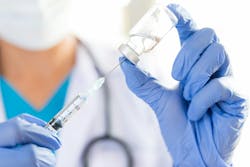Better use of vaccines could reduce antibiotic use by 2.5 billion doses annually, says WHO
A new report by the World Health Organization (WHO) finds that vaccines against 24 pathogens could reduce the number of antibiotics needed by 22% or 2.5 billion defined daily doses globally every year, supporting worldwide efforts to address antimicrobial resistance (AMR).
While some of these vaccines are already available but underused, others would need to be developed and brought to the market as soon as possible.
The new report expands on a WHO study published in BMJ Global Health last year. It estimates that vaccines already in use against pneumococcus pneumonia, Haemophilus influenzae type B (Hib, a bacteria causing pneumonia and meningitis) and typhoid could avert up to 106,000 of the deaths associated with AMR each year. An additional 543,000 deaths associated with AMR could be averted annually when new vaccines for tuberculosis (TB) and Klebsiella pneumoniae, are developed and rolled out globally. While new TB vaccines are in clinical trials, one against Klebsiella pneumoniae is in early stage of development.
The report analyzed the impact of already licensed vaccines as well as vaccines in various stages of development.
Every year, vaccines against:
- Streptococcus pneumoniae could save 33 million antibiotic doses, if the Immunization Agenda 2030 target of 90% of the world’s children were vaccinated, as well as older adults;
- Typhoid could save 45 million antibiotic doses, if their introduction was accelerated in high-burden countries;
- Malaria caused by Plasmodium falciparum could save up to 25 million antibiotic doses, which are often misused to try to treat malaria;
- TB could have the highest impact once they are developed, saving between 1.2 to 1.9 billion antibiotic doses – a significant portion of the 11.3 billion doses used annually against the diseases covered in this report.
If vaccines could be rolled out against all the evaluated pathogens, they could save a third of the hospital costs associated with AMR.

